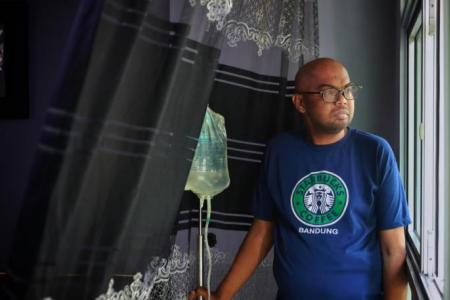Chronic kidney disease on the rise in Singapore: NKF medical director
Mr Mohamed Sharil Sham used to enjoy playing soccer, running, and taking yearly trips overseas.
But these are now distant memories for the minibus driver. For even though he is only 37 years old, he has trouble standing up on his own - the result of end-stage chronic kidney disease.
"My legs are very, very weak... when I go up a kerb, I have to get someone to help me balance," Mr Sharil, who has been on dialysis for about a year and a half, told The Straits Times on Wednesday (Jan 26).
Dr Behram Ali Khan, medical director of the National Kidney Foundation (NKF), said that there has been a worrying increase in patients with chronic kidney disease here in recent years.
A person is said to have this condition when they have had kidney disease for more than three months, he said.
In Singapore, this is typically the result of hypertension, diabetes, or a combination of the two.
"Both of these conditions are very prevalent in Singapore," said Dr Behram, adding that based on several studies, about two out of three Singaporeans are at risk of developing chronic kidney disease in their lifetime.
"There's a continuous and progressive trend of more patients entering dialysis every year," he said, noting that the NKF has been seeing over 100 applications for admission every month, up from about 60 per month a few years ago.
Associate Professor Jimmy Teo, head and senior consultant at the Division of Nephrology in the National University Hospital's Department of Medicine, said he has also seen more patients referred for kidney disease in recent years.
Referring to the Singapore Renal Registry Annual Report 2019, which was published in mid-2021, Prof Teo pointed out that the number of patients on definitive dialysis here had almost doubled from 741 in 2010 to 1,202 in 2019.
"If you have the same number of doctors and nurses and facilities, you cannot cope with that. If it comes in a big wave, then that's when you have a big problem - which is essentially where we're at now, at the cusp, or seeing the early part of it," said Prof Teo.
Dr Behram said there are a number of factors that could lead to someone developing chronic kidney disease. These include genetic predispositions, being overweight, a sedentary lifestyle, diet, smoking, and old age.
Prof Teo said that Singapore's ageing population, combined with greater screening efforts, could be behind the rising number of patients in recent years.
In the case of Mr Sharil, his condition was the result of a love for sugary drinks in his younger days, as well as a reluctance to seek help for nearly two decades.
After being diagnosed with diabetes in the late 90s, he did not get any professional treatment for his condition until 2020, as he worried about the financial costs.
"After (diagnosis), I went to National Service, and my salary was not that high. I needed to give money to my family as well... at the time I was young, so I didn't think much of it, I thought never mind, sure can cure," he said.
His condition worsened until one day in 2020, he realised he was so breathless he could not walk or even lie down. After going to the hospital, he was told his lungs were full of fluid and his kidneys were no longer functioning.
"How I wish I could turn back time! I would take better care of myself," said Mr Sharil.
Dr Behram said there are several ways to tackle chronic kidney disease, including treating underlying conditions such as high blood pressure and high sugar.
A kidney transplant is the best option for those with kidney failure, he added, encouraging people to donate their kidneys as the waiting time for a kidney from a deceased donor here is very long.
Dr Behram said that lifestyle modifications are important too, such as exercising more, monitoring weight, quitting smoking, and eating better.
Prof Teo added that this includes avoiding added salt, eating lots of fruits and vegetables, and choosing whole grains. This is to avoid overloading whatever kidney function is still intact.
Such lifestyle modifications can also help to prevent chronic kidney disease from developing in the first place.
Prof Teo also said that 80 to 90 per cent of patients with diagnosed kidney disease will need medication. These include a new class of drugs known as sodium-glucose co-transporter 2 inhibitors, or SGLT-2 inhibitors.
Such drugs block sugar and sodium from being reabsorbed by the kidney.
One particular drug, dapagliflozin, not only treats diabetes and high blood pressure but also reduces the progression of chronic kidney disease, said Dr Behram.
Prof Teo and Dr Behram both agreed that early screening and treatment is also critical in tackling the disease.
"If you are above 30 and have any other risk factors like high blood pressure, high blood sugar levels, are overweight or have family members with kidney disease, you should definitely get medically screened," said Dr Behram.
Prof Teo said that identifying the disease early and preventing it from progressing is "the most crucial task" to focus on.
He added: "Get treated earlier. There are some breakthroughs in treatment that can significantly reduce the risk of end-stage kidney failure... you can make a positive impact on your life."
Get The New Paper on your phone with the free TNP app. Download from the Apple App Store or Google Play Store now


